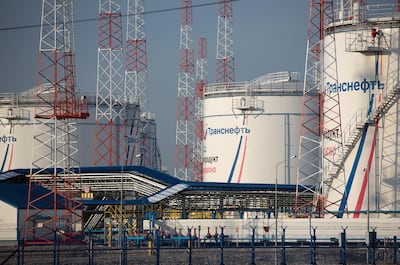The US oil price turned negative on Monday for the first time in history on concerns of an increase in supply to the market, a saturation of storage capacity and subdued demand due to the coronavirus pandemic that has brought the world economy to a halt.
The May West Texas Intermediate contract, the benchmark for US oil, fell $19.06, or 104.3 per cent, to a discount of 79 cents per barrel at just after 10pm UAE time after touching an all-time low of -$1.43 per barrel.
In such a situation, producers are expected to pay potential buyers to take their output.
The Brent crude benchmark was down $1.85, or 6.6 per cent, at $26.23 per barrel. The June WTI contract is trading more actively at a much higher level of $21.6 per barrel. The spread between May and June was more than $23, the widest in history for the two nearest monthly contracts.
Investors bailed out of the May contract ahead of expiry later on Monday because of lack of demand for the actual oil, Reuters said. When a futures contract expires, traders must decide whether to take delivery of the oil or roll their positions into another futures contract for a later month.
Futures in New York for May collapsed in spite of a global pact to draw down as much as 20 million barrels per day from the markets.
In response to the oil price collapse, after the market close, US President Donald Trump said his administration was reviewing the possibility of stopping incoming Saudi Arabian crude oil shipments as a measure to support the battered domestic drilling industry.
Mr Trump reiterated his promise on Monday that the United States will purchase as much as 75 million barrels of oil and put it into the strategic reserve for the first time in decades.
"That would be the first time in a long time that it has been topped out. We get it for the right price," Mr Trump said.
Later in the press conference, Mr Trump said he would only buy that amount if Congress authorised the funding, or if the federal government could rent storage space to third parties for a fee.
However, the Opec+ agreement, which relies on involuntary cuts for half the drawdown is expected to kick in from May.
Against this backdrop, crude is running out of storage facilities with global capacity expected to reach saturation as soon as May, according to estimations by various energy agencies, due excess supply and low demand.
Opec+ is set to enforce 9.7m bpd of cuts from May, however, the producers led by Saudi Arabia are bringing record levels of output to the market in April.
Opec+ appeared open to suggestions for more than agreed to share of cuts should the price rout continue. The alliance was monitoring the oil markets closely and was prepared to take "further measures jointly with Opec+ and other producers, if deemed necessary" Riyadh and Moscow said in a joint statement over the weekend.
"If the Opec+ deal carries on last previous iterations we would expect to see voluntary Saudi over-compliance, i.e., cutting more than its share of the deal provided that other producers make an effort to cut output as well," said Aditya Pugalia, director, financial markets research at Emirates NBD.
Global oil storage capacity is close to the brim and the US energy department is reportedly considering paying producers to keep their oil reserves untapped. The department of energy stepped up buying of crude when prices bottomed however domestic and global capacities are close to full.
US crude stocks at refineries and tank farms, which averaged 375m barrels at the end of last week have filled up 57 per cent of available capacity, according to the Energy Information Authority.

Demand is well behind and storage could already be at 70-80 per cent capacity, according to the London Capital Group.
"In extreme pockets of the market, there could already be no storage and even negative oil prices," said Jasper Lawler, head of research at LCG.
Markets were in a state of 'super contango' where spot prices for US crude were lower than the forward price, ahead of the expiry of the May contract on Tuesday.











